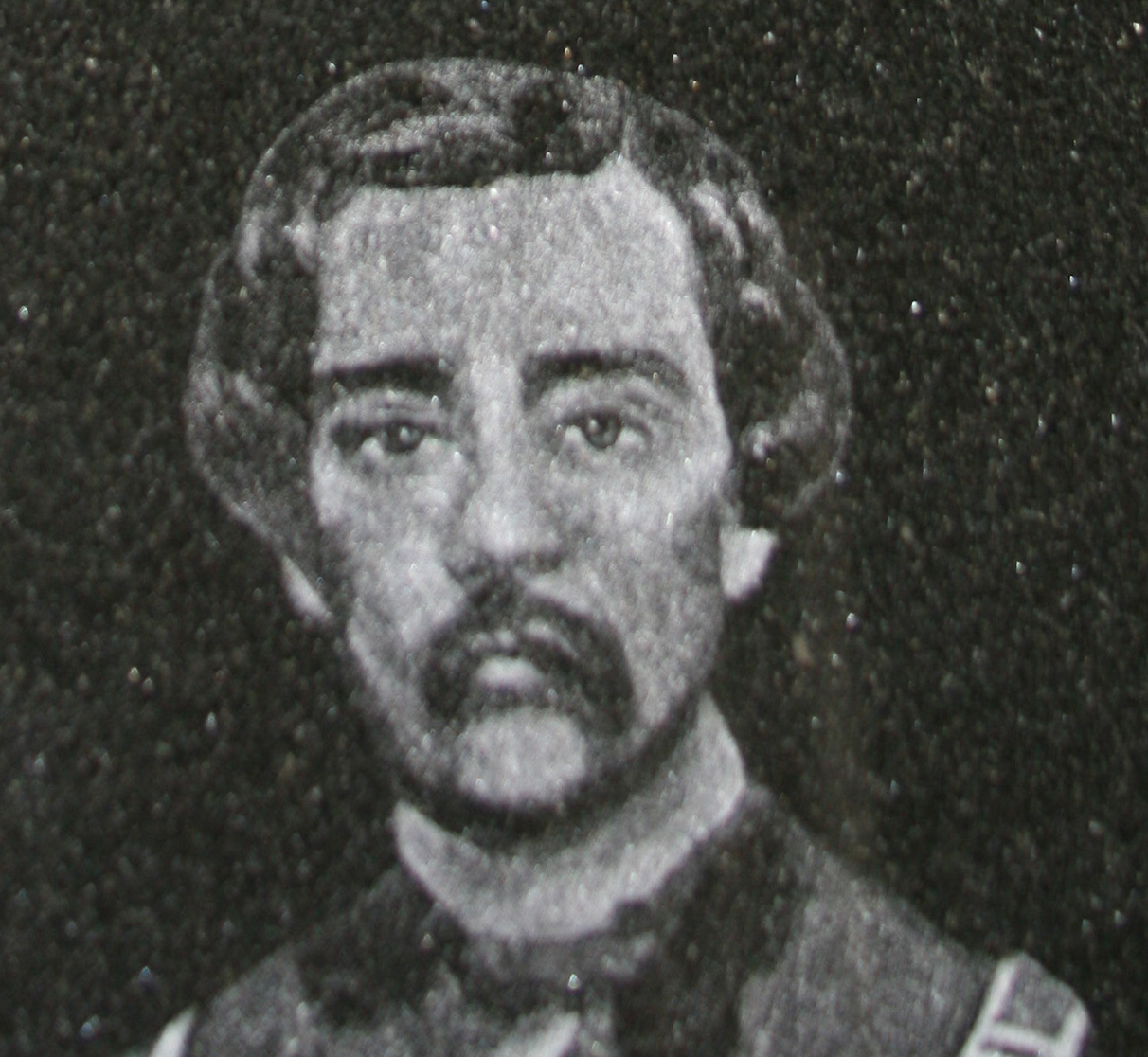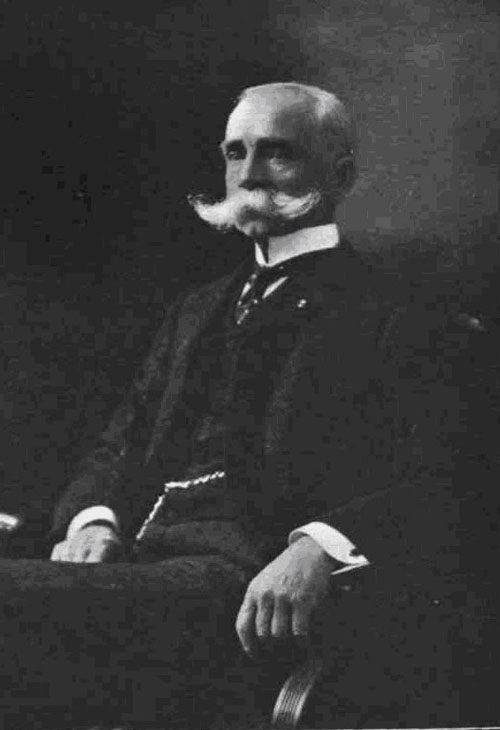Colonel John Healy
Soldiers:
HEALY, COL. JOHN G., born in New Haven, Ct., Feb. 12, 1841; son of Thomas and Mary (Gray) Healy. He was the oldest of eight children, the others being: (2), Mary A.; (3), James; (4), Bridget; (5), Elizabeth M; (6), Thomas F.; (7), Bartholomew T.; (8), Margaret T. Of these, Elizabeth M. is principal of the Davenport school, New Haven. Thomas F. became a priest, and died at Windsor Locks, Ct. John G, the subject of this sketch, attended the schools of Rose Toole, Patrick Morrisey and Amos Smith, in New Haven, and subsequently learned the trade of marble cutter. Early acquiring a taste for military knowledge, he became a member of the famous Emmet Guard, of New Haven, an organization that furnished many officers to the army of the Union.
 |
He enlisted in Company C, Ninth regiment, Aug. 20, 1861; was mustered as first lieutenant, Oct. 30, that year, and was promoted captain of the company, April 15, 1862. Upon the consolidation of the regiment into the Ninth battalion, in Oct., 1864, he being the senior captain was 22 given command of the latter. He was promoted lieutenant-colonel, Dec. i, 1864, and was mustered out with the battalion in Aug., 1865. |
He participated with the Ninth in many important events of the Civil war, and proved himself a very superior officer. Since the war, he has been vice-president of the Nineteenth Army Corps Association and was selected by the executive committee to present the testimonials of the Association, on the demise of Gen. Phil. Sheridan and Gen. W. H. Emory, to their widows in 1866, Col. Healy, in company with Capt. Lawrence O'Brien and Lieut. Joseph H. Lawler, of the Ninth, C. V., went to Ireland, in connection with the Fenian movement, in which many other veteran officers of the Union army participated. Col. Healy was arrested in the city of Limerick and was a prisoner in the hands of the British for six months.
| On his return to New Haven, he was given a great ovation. He was subsequently Assistant Adjutant-General, with the rank of Colonel, on the staff of Gov. Luzon B. Morris, of Connecticut, and has always enjoyed a high degree of popularity in the state. Col. Healy is a member of the Military Order of the Loyal Legion, of the Army and Navy Club of Connecticut, of Admiral Foote Post, G. A. R., New Haven, and of the Second Company of the Governor's Foot Guard. Since the Civil War closed, he has been a member of the New Haven board of aldermen, for two years, and superintendent of gas and lamps, in that city, for six years. He resigned this latter position to become superintendent of the folding department of the U. S. House of Representatives, occupying the position four years. |  |
He is at present engaged in the insurance business. Still vigorous and active, he undertook, upon the outbreak of our recent war with Spain, to organize an Irish regiment. He communicated with the Governor of Connecticut and received much encouragement. The New Haven Leader, May 3, 1898, stated that "As the result of a visit to Governor Cooke at Hartford last week Colonel John G. Healy is accepting applications from men who want to enlist in a regiment which the colonel intends to organize. Within a day or two Colonel Healy expects to receive from Adjutant-General Haven authority to enlist men for his regiment. Already, it is stated, that, without the receipt of authority from the Governor, nearly fifty men have applied to the colonel to be numbered among the volunteers which the colonel will turn over to the service of the state if they are needed. When the war preparations begun Colonel Healy formally offered his services to the governor and promised to raise a regiment of volunteers to be composed of Irish-Americans or men of Irish extraction. Until last week the colonel has had no further communication with the Governor about the proposed Irishmen's regiment. Last Wednesday he went to Hartford and had a long talk with the Governor and with Colonel Landers, the assistant adjutant-general. Adjutant General Haven was in Washington on that day and it was impossible for Colonel Healy to see him. When Colonel Healy explained his purpose to the Governor the latter expressed pleasure at the proposition and gave his unqualified approval of it. The situation with regard to the proposed organization was gone over with both the Governor and Colonel Landers, the latter also approving of the plan. Colonel Healy's idea was to have the proposed regiment organized and in readiness to respond to a call when its turn came after the National Guard had been given its chance. He told Colonel Landers that he could furnish a fighting regiment and have it ready to take the field when the call came. The Governor practically told him to go ahead and get ready for it. So much assurance was given him that his plan was approved that Colonel Healy is confident that he will receive authority to proceed with the enlistment within a short time. Yesterday he wrote to Colonel Landers asking for the desired authority and expects to hear favorably from the assistant adjutant general shortly. Upon receipt of it he will detail men with authority to enlist men and have them constantly on hand for that purpose. At present applications are being made personally to him. A number of men have offered their services to take applications for enlistment. Colonel Healy said this morning that his design was to recruit three companies in New Haven and have the other companies from different cities. He has already been in communication with prominent Irish-Americans in Water-bury, Bridgeport, Naugatuck, Middletown and other places, who want to enlist companies in their respective cities to join Colonel Healy's proposed regiment. As soon as the desired authority is received Colonel Healy will notify the men to proceed to accept enlistments. He says men in all parts of the state will be given an opportunity to enlist." Later, a recruiting office was opened at 99 Congress Ave., New Haven, with Capt. J. H. Mc-Govern in charge, and another at 240 Hamilton St., in charge of James H. Cannon. At one time, five companies were in process of being recruited. The unexpectedly brief duration of the war, however, rendered the projected regiment unnecessary. Speaking of his services in the Civil war, Dr. Rollin McNeil, of New Haven, pays the following tribute to Col. Healy: "As surgeon of the Ninth Connecticut Veteran Volunteers, I was thrown into most intimate relations with him. The friendship that resulted has continued during all the long years since the Civil War. His bravery in the field is a matter of record. The day Sheridan made his famous ride, Col. Healy was in the forefront, the colors in his hand. I don't think he ever knew the meaning of the word 'fear.' He led his men in battle; he cared for them in camp, and on the march, with a solicitude that won their affection. A thorough disciplinarian, when discipline was necessary, he stood always for the rights of his men, and the honor of the command. IB. can recall nothing but pleasant memories of the days when we marched and camped together. We were boys then; we are gray-haired veterans now, yet we still touch elbows with the few old comrades—noble fellows all of them—who are still this side of the great divide, proud of our regiment, proud of its record, drawing closer to each other as our ranks grow thinner, keeping alive the old friendship and the old enthusiasms. And so may it be to the end."
An added comment from Murray’s History (Page 110): “From this place the regiment went to a point on the Mississippi river opposite Vicksburg, and on June 25th was put to work, with other regiments, in cutting the famous canal which was expected to isolate Vicksburg by diverting the river away from its wharves and rendering them unapproachable to shipping. During the continuance of this work, a force of twenty picked men, under Capt. Healy and Lieutenant Patrick T. Claffee, [both of Co. C], was crossed over the river under cover of darkness, and remained in the swamp under the guns of Vicksburg for eight days. The work was finally abandoned as not feasible, though not until the Ninth had suffered severe loss from the terrible exposure of the men."
From Murray’s History (pages 199-200) the counterattack at Cedar Creek, VA was described as follows:
When Sheridan arrived and the Union rout was checked and turned into an attack upon the Confederates, the Ninth Battalion was in the forefront of the fray. At one time during the charge, Col. Healy seized the colors and waving them aloft, shouted to his command: "Come on, boys, follow me!" He was answered with a tremendous cheer and the battalion rushed on. Lieut. Col. Healy in his report says: "I desire to make particular mention of Sergeant W. Perry, and Private John T. Morrow, who, after the color-sergeant had been wounded, seized the colors and pushed forward. These men were always in the advance, few, if any, color-bearers being able to keep up with them. The colors of my battalion were the first on the recaptured works from where the corps had been driven in the morning. In less than five minutes, no less than a dozen stands of colors were around us."
The total loss to the Confederates was 2,000 killed and wounded, and 1,500 prisoners. It was practically the end of Early's operations in the Shenandoah Valley.
Cpl John Alexander
Pvt Albert Andrews
Mus Charles Andre
Pvt Josiah Barker
Pvt David Barry
QM Nathan Bennett
Lt John Bolger
Sgt William Brown
Pvt Dominick Burns
Sgt Bernard Caffrey
Col Thomas W. Cahill
Pvt John I. Cain
Pvt Ambrose Carney
Lt John Carroll
Lt Daniel Carroll
Pvt John Carroll
Lt Patrick T. Claffee
Capt Thomas Coates
Cpl John P. Coen
Cpl Michael P. Coen
Sgt Michael Cronan
Pvt Patrick Cullen
Capt Elliot Curtis
Lt John Curtis
Mus Dennis Deegan
Pvt Levi S. Drew
Capt John Duffy
Lt Fredrick M. Fairchild
Pvt Daniel Farrell
Lt Col Richard FitzGibbon
Pvt Patrick Flanagan
Mjr Frederick Frye
Surg Charles Gallagher
Capt Patrick Garvey
Sgt Daniel Gallagher
Lt William Gleeson
Capt James Graham
Sgt Malachi Hackett
Pvt John Hazlett
Prin Muc John Healy
Lt Col John G Healy
Pvt Edward Heffernan
Sgt Daniel Heffernan
Capt James Hennessey
Pvt Michael Horrigan
Lt Patrick Ingoldsby
Pvt Martin Joyce
Pvt Patrick Kane
Pvt Patrick Lane
Pvt Patrick Larkin
Lt Joseph Lawler
Lt James Lawler
Lt Thomas Lawler
Pvt John Marlow
Capt Michael McCarten
Chap Daniel Mullen
Sgt James T. Mullen
Lt Michael Mullins
Capt Lawrence O'Brien
Lt William O'Keefe
Lt Daniel O'Sullivan
Capt Charles Palmer
Sgt Phillip Reilley
Chap Leo Rizzo
Sgt Timothy Ryan
Capt Gary Scott
Lt John Shaw
Capt Terrance Sheridan
Lt Christian Streit
Sgt Thomas Tallmadge
Capt David C. Warner
Pvt Robert Walsh
Capt Michael Williams
Capt William Wright